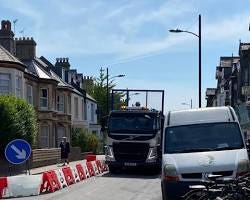#Bristol - Reconnecting East Bristol: A Promise of Partnership, Not Autocracy!
Beyond the Green Vision: Practical Solutions for East Bristol
Bristol's growing sense of marginalisation and disconnection from local democracy stems from a confluence of factors, as evidenced by media reports and community feedback. A key issue is the perception of top-down decision-making, particularly concerning transport and urban planning. The rapid implementation of "Liveable Neighbourhoods" and traffic measures, often without sufficient community consultation, has fostered resentment among motorists and residents who feel their voices are ignored.
The feeling is that the Green administration, in its zeal to enact its agenda, has prioritised ideological goals over practical considerations and community needs. This perceived lack of dialogue and responsiveness has created a sense of alienation, particularly among those who feel their daily lives are negatively impacted by these policies. Additionally, concerns about affordability, housing, and the cost of living, combined with a perception of unequal distribution of resources, further contribute to feelings of marginalisation. Many residents, especially those in less affluent areas of the city, feel that their concerns are not adequately addressed by the city council.
Furthermore, the perceived disconnect between the council's priorities and the everyday realities of many Bristolians exacerbates the issue. The focus on ambitious, long-term environmental goals, while important, has been seen by some as neglecting more immediate and pressing concerns such as poverty, crime, and access to essential services. This disconnect is amplified by the perception that the council's communication and engagement strategies are inadequate, failing to effectively reach and involve diverse communities. The result is a growing sense of frustration and disillusionment, with many residents feeling that their voices are not heard and that their needs are not being met. This sense of powerlessness is further exacerbated by the feeling that the council's policies are being imposed rather than developed collaboratively.
To address these concerns and win back the trust of the local population, a hypothetical manifesto would need to prioritise community engagement, practical solutions, and a balanced approach to policy-making. It would need to demonstrate a commitment to listening to and responding to the concerns of all residents, regardless of their background or political affiliation. So, how’s this for a hypothetical suggestion, City Council?
Hypothetical Manifesto: Bristol's Bridge to Unity
Genuine Community Engagement:
Establish a network of accessible community forums and citizen assemblies, ensuring diverse representation. Take council meetings out to the people most affected by major infrastructure decisions, such as ‘Liveable Neighbourhoods,’ and use these opportunities for collaborative working practices during evenings and weekends when people are available to contribute. To hold meetings at City Hall is not only outdated, but it also displays a sense of arrogance and disregard for care.
Implement transparent and inclusive consultation processes for all major policy decisions, especially regarding transport and planning.
Fully utilise digital platforms and local media to enhance communication and gather feedback.
Create a citizens jury to review and provide recommendations on major polices.
Balanced Transport Solutions:
Conduct thorough impact assessments of "Liveable Neighbourhoods" and traffic measures, considering the needs of all road users.
Invest in improving public transport infrastructure and frequency, providing viable alternatives to private car use.
Implement phased traffic calming measures, prioritising safety while minimising disruption to local businesses and residents.
Provide financial support for those who need to convert to electric vehicles, and improve the charging infrastructure where funds allow.
Affordable Housing and Economic Opportunity:
Increase the supply of affordable housing through partnerships with housing associations and community land trusts.
Support local businesses and entrepreneurs, fostering job creation and economic growth.
Implement targeted initiatives to address poverty and inequality, focusing on education, training, and access to essential services.
Practical Environmental Sustainability:
Prioritise practical and achievable environmental initiatives that have tangible benefits for residents, such as improved waste management and green spaces.
Collaborate with local businesses and organisations to promote sustainable practices and reduce environmental impact.
Create a local fund for residents to improve the energy efficiency of their homes, and to install renewable energy where funding can be accessed.
Transparent and Accountable Governance:
Enhance transparency and accountability in council decision-making, providing clear and accessible information to the public.
Strengthen oversight mechanisms to ensure that council resources are used effectively and efficiently.
Create a system of online voting for local issues.
Commit to regular public audits of council spending.
Safety and Community Cohesion:
Increase funding for community policing and other measures to tackle anti-social behaviour.
Invest in community centres and youth programmes.
Work with community groups to promote integration and reduce isolation.
This cobbled-together idea of a manifesto suggests bridging the gap between the council and the community by prioritising practical solutions, genuine engagement, and a balanced approach to policy-making. It recognises the importance of environmental sustainability while also addressing the immediate needs and concerns of all Bristol residents, ensuring that the city's future is built on a foundation of inclusivity and collaboration.
Mind you, what do I know?




While this might appear, at first glance, to be a commendable exercise in local planning and community foresight, let’s not delude ourselves with such quaint illusions. The reality is that every simpering, suit-clad member of the council is nothing more than a marionette jerked about by their globalist puppetmasters. Their strings are pulled not by the needs of their constituents, but by the technocratic elite lounging in Davos, murmuring mantras from the WEF and UN as if they were sacred scripture.
Enter the C40 initiative—a grand utopian fantasy masquerading as urban policy, imposed with the smug self-righteousness only the globally-anointed can muster. It’s not a suggestion. It’s not an idea to consider. It is an edict, carved in stone by unelected international busybodies who have never so much as stepped foot in the communities they claim to "save." Every so-called leader desperate to cling to their seat at the Global Leaders table has long since mortgaged their conscience and credibility for a bowl of technocratic porridge.
And why? Because membership in this grotesque little club requires absolute fealty to a vision of the world where individuality is a threat, independence is a sin, and every aspect of human life is monitored, managed, and molded into bland compliance with the global-homo blueprint of sterile, standardized dystopia. You don’t get a gold star in their ledger unless you’ve proven your willingness to sell out your citizens for the applause of international parasites who wouldn’t know genuine humanity if it screamed in their faces.
Feel free! Oh, and thanks for asking :-)